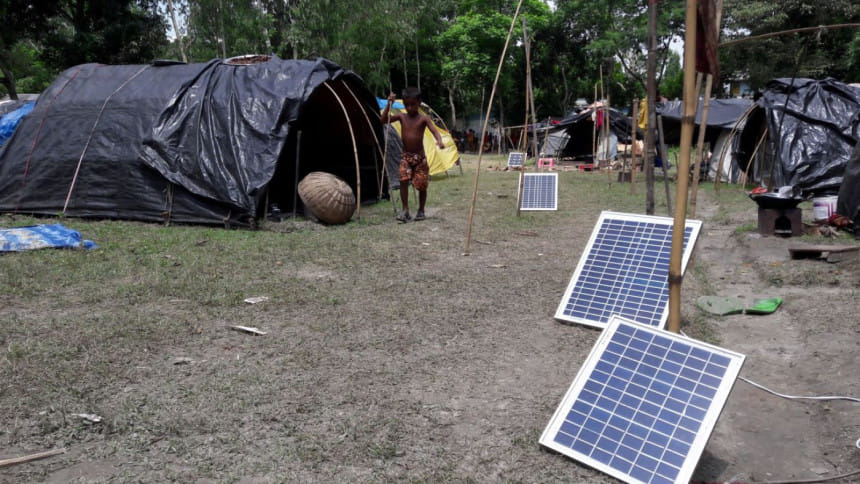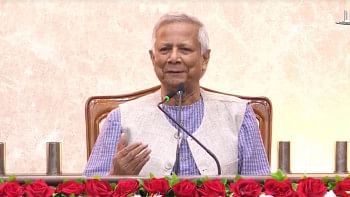Solar power adds modernity to nomadic life in Lalmonirhat

It's not easy being a nomad in the 21st century. It's not only traditional matters like moving residences, selling traditional remedies and practising magic that need to be managed. There are other challenges such as how to run the television set and where to charge the mobile phone. In Lalmonirhat, a group of Bedey have found a way to meet the demands of modern nomadic living: solar power.
For the past 20 days, about 91 people from 19 Bedey families have been staying at Mostafi village in Lalmonirhat sadar upazila. "We are from Savar in Dhaka," says Abdul Matin, the group's sarder, or leader. "We move around the country for about 10 months of the year."
Matin notes that most of the families in the group are using solar electricity. "Solar makes life easy and comfortable," he says. "Only four families don't have solar and they're hoping to buy it soon."
Until they installed 20 – 40 watt solar panels a year ago, the community relied on kerosene lamps for lighting, which offered low levels of illumination and a significant risk of their temporary dwellings catching fire. It was also costlier. "We can save up to 40 taka per day on fuel costs due to solar, which leaves more for family expenses," says one group member.
According to Matin, magic and traditional medicine won't make one rich. "We can earn about Tk 500 per day in a village," he says. It makes the cost saving on fuel more meaningful. Besides, solar doesn't only offer light. Televisions and mobile charging are no problem, and, says Akhlia Begum of the group, they can also use small table fans to help with the heat. "Solar power has made life better," she says, "and we feel safer at night."
Sayem Ali of the group says his family is yet without solar, as he is still saving to buy it. "Due to money shortage we don't have solar," he says, "It needs up to Tk 15,000 to buy the panel, but I hope I will be able to purchase one within the next two weeks." He observes that solar electricity is playing a key role in facilitating improved lifestyles.
Another group member Sabedul Islam says they carry the panels with them wherever they go, usually settling at one site for 20 to 30 days. "We like to watch TV," he says, "and in that, we even have advantage over national grid electricity users who can experience load shedding during storms. Solar power is constant."
Meanwhile Mostafi village locals are taking note of the improved Bedey lifestyle. "It takes a little investment for the panel," says one villager, Zahurul Islam, "but there is a fuel cost saving. I now wish to install a panel at my house in the near future."
The Bedey meanwhile are appealing to the government to help with installation costs for the poorer members of their community.

 For all latest news, follow The Daily Star's Google News channel.
For all latest news, follow The Daily Star's Google News channel. 



Comments